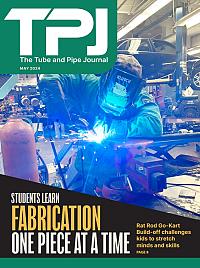Editor
- FMA
- The Fabricator
- FABTECH
- Canadian Metalworking
Categories
- Additive Manufacturing
- Aluminum Welding
- Arc Welding
- Assembly and Joining
- Automation and Robotics
- Bending and Forming
- Consumables
- Cutting and Weld Prep
- Electric Vehicles
- En Español
- Finishing
- Hydroforming
- Laser Cutting
- Laser Welding
- Machining
- Manufacturing Software
- Materials Handling
- Metals/Materials
- Oxyfuel Cutting
- Plasma Cutting
- Power Tools
- Punching and Other Holemaking
- Roll Forming
- Safety
- Sawing
- Shearing
- Shop Management
- Testing and Measuring
- Tube and Pipe Fabrication
- Tube and Pipe Production
- Waterjet Cutting
Industry Directory
Webcasts
Podcasts
FAB 40
Advertise
Subscribe
Account Login
Search
New trails, old-school values for Precision Tube Laser
Founder Jordan Yost combines high-tech tools, focus on relationship for fabrication business
- By Lincoln Brunner
- April 2, 2024
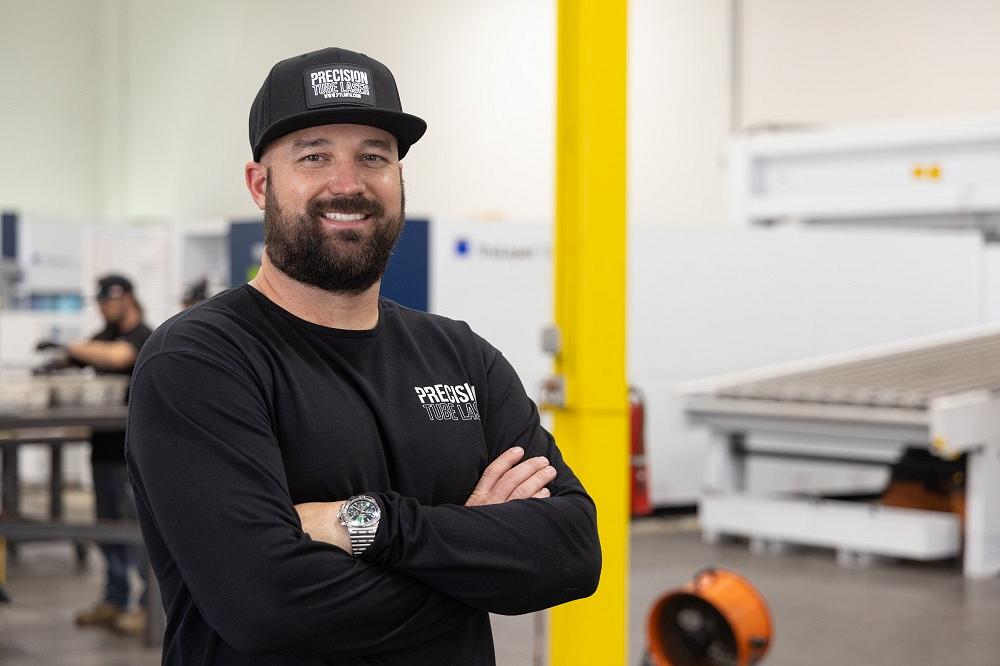
Jordan Yost learned from his business mentors that your handshake matters and your word is your bond. He never forgot it. Precision Tube Laser
Few people looking at a fab shop sporting million-dollar machines operated by teenagers, relying on social media for its marketing, and run by a guy wearing a ball cap and T-shirt would readily guess that it’s rooted in old-school business values.
Then again, Precision Tube Laser and owner Jordan Yost have been surprising people since the business opened six years ago with a laser tube cutter, backed by a willingness to risk big investments and a focus on customer relationships that registers just this side of obsessive.
Business Morals Count
“For me, it starts with a good structure: What are our business morals?” said Yost, who jumped from the car rental business into the metal fabrication game with some previous fab shop experience but none as a manager or owner in that realm. “What do we stand for? Not only the end product, but how do we handle clients—customers or our own personnel? Does anybody get special treatment? If they do, why? Having those good core business morals and making sure that everybody understands what our company stands for and what we are about—that’s the baseline for me."
PTL specializes these days in laser-cutting flat parts for customers nationwide—a client base built almost entirely through its Instagram page, which features a robust stream of photos and videos of its latest jobs and has almost 71,000 followers. It’s a rarity for a manufacturing business to lean its marketing efforts so heavily on social media, and almost unheard of in metal fabrication. It has served PTL well, though: Since launching in 2018, the company has become a $5.2 million business, growing from four employees to between 17 and 25 workers at any given time.
As revolutionary as Yost’s tactics might be relative to his peers, his underlying ethic mirrors what many would consider prototypical blue-collar values. And that’s no accident.
“I was pretty fortunate early in my career as a business owner to be around a lot of old-school businesspeople,” he said. “Your handshake meant everything; your word meant everything. They instilled that in me at a very young age. The most important thing is, do exactly what you say you’re going to do, and no one will ever be disappointed. That’s something that always really stuck with me: Don’t say something you’re not willing to do, because somebody will call you out on it.”
Be Transparent
Yost largely credits adherence to that ethic for the solid relationships that PTL has established with its growing list of customers. Yost is also big on one thing that manufacturers traditionally have avoided like poison ivy: transparency. While others may be more comfortable keeping their inner workings under wraps, PTL prefers to let people see under its hood so that they know exactly what they should, and should not, expect.
For example, if something internally goes wrong—a machine goes down, a shipment gets delayed, whatever—Yost feels it is incumbent on him to make sure PTL keeps its customers in the loop about what happened and why, right away. Rather than worry about how customers are going to react, the idea is simply to tell them the truth and let them handle it while his team addresses the problem.
“Look, it’s impossible to be perfect,” Yost conceded. “It’s impossible for things to go right all the time. But when it goes bad, pick up the phone. Call somebody. Communicate with them. Don’t leave them in the dark. Just say, ‘Hey, this was out of our control, but when we can fix it, we’re going to fix it, and here’s our plan.’
“Everybody wants some form of attention, and they want to be treated as if they’re the most important, whether they’re doing 10 parts or 10,000 parts,” he added. “And that’s something we’ve built into our business from the very beginning, because we treat everybody like that. It’s more about harnessing the relationship than it is about actually cutting the parts. We know we’re really good at that. But we’re also really good at protecting the relationships, making sure that communication is there, and that at any point in time, somebody can call us and say, ‘Hey, what’s going on?’ and we have an answer for it.”
Trust the Team
Another important part of the equation for Yost is that when customers make that call, they know to work with the team that he and PTL’s leadership have assembled rather than call him directly first thing. For a small shop with, at most, a couple dozen employees running the whole operation, making the very best use of time is vital. Otherwise, the process can grind to a crawl quickly, and suddenly the reputation for rapid customer response that PTL has worked hard to build is jeopardized because the boss is spending his own time doing what, out of necessity, he has already equipped other people to do.
For a shop that is still a relative newcomer, reinforcing that response structure—what Yost calls a “line of defense”—takes careful work. And it’s not as if Yost won’t get personally involved with projects. He does. But for everyone’s sake, customers can’t be texting his cell number asking to add 10 parts to a certain run. That’s just asking for something to slip through the cracks.
“You’ve got to feel out what they need,” Yost said. “My team is really, really good at nurturing customers that need a little bit more time and a little bit more catering to. But then there are some people who want to just go to the top—they want to get to myself or my operations manager or my lead designer. And it’s like, ‘OK, let’s just slow down here. Let’s figure it out. We’re not saying you can’t have that time, but let’s be organized. My time’s expensive, your time’s expensive; let’s not waste it.’
“I’ve got such a great line of defense of [people] figuring out, ‘OK, it’s time for you to step in. It’s time for you to give some one-on-one time.’ It’s a difficult thing to navigate. Obviously, we’re busy, they’re busy. There’s so much going on. So how you make it all work is not easy at times. There are only so many hours in a day.”
As PTL has added more and more top-end machinery (the most recent example being a TRUMPF TruLaser Center 7030 laser cutting system), the company has been able to take on more work while continuing its no-minimums approach to orders. As Yost works to keep his entire team as educated as they can be from first phone call to quality parts out the door, he remains focused on keeping relationships primary so that people continue to get what they paid for.
“Our customers aren’t paying for a service—they’re paying for a result,” Yost said. “How we communicate with them, how we deal with them, how quickly we turn their parts, all that is the service. But the result is what they’re asking for. How we get there is important, having that good structure of business morals.
“For me, one of the most important things is honesty. I think when you operate a business under those terms of full honesty and transparency, it allows you to build relationships quicker, not only with customers, but also with your own personnel, because you’re vulnerable. You become human to them. Having that honesty and transparency makes you vulnerable, but also brings back the human element to what we do. We’re just normal people who are educated in a certain form of business. We just do it a different way.”
subscribe now
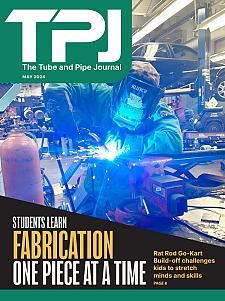
The Tube and Pipe Journal became the first magazine dedicated to serving the metal tube and pipe industry in 1990. Today, it remains the only North American publication devoted to this industry, and it has become the most trusted source of information for tube and pipe professionals.
start your free subscriptionAbout the Author

Lincoln Brunner
2135 Point Blvd.
Elgin, IL 60123
(815)-227-8243
Lincoln Brunner is editor of The Tube & Pipe Journal. This is his second stint at TPJ, where he served as an editor for two years before helping launch thefabricator.com as FMA's first web content manager. After that very rewarding experience, he worked for 17 years as an international journalist and communications director in the nonprofit sector. He is a published author and has written extensively about all facets of the metal fabrication industry.
About the Publication
Related Companies
- Stay connected from anywhere

Easily access valuable industry resources now with full access to the digital edition of The Fabricator.

Easily access valuable industry resources now with full access to the digital edition of The Welder.

Easily access valuable industry resources now with full access to the digital edition of The Tube and Pipe Journal.
- Podcasting
- Podcast:
- The Fabricator Podcast
- Published:
- 04/16/2024
- Running Time:
- 63:29
In this episode of The Fabricator Podcast, Caleb Chamberlain, co-founder and CEO of OSH Cut, discusses his company’s...
- Trending Articles
Team Industries names director of advanced technology and manufacturing

Orbital tube welding webinar to be held April 23
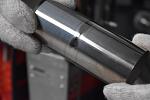
Zekelman Industries to invest $120 million in Arkansas expansion
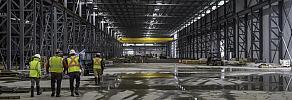
Push-feeding saw station cuts nonferrous metals
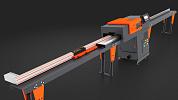
3D laser tube cutting system available in 3, 4, or 5 kW
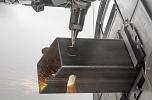
- Industry Events
16th Annual Safety Conference
- April 30 - May 1, 2024
- Elgin,
Pipe and Tube Conference
- May 21 - 22, 2024
- Omaha, NE
World-Class Roll Forming Workshop
- June 5 - 6, 2024
- Louisville, KY
Advanced Laser Application Workshop
- June 25 - 27, 2024
- Novi, MI
























